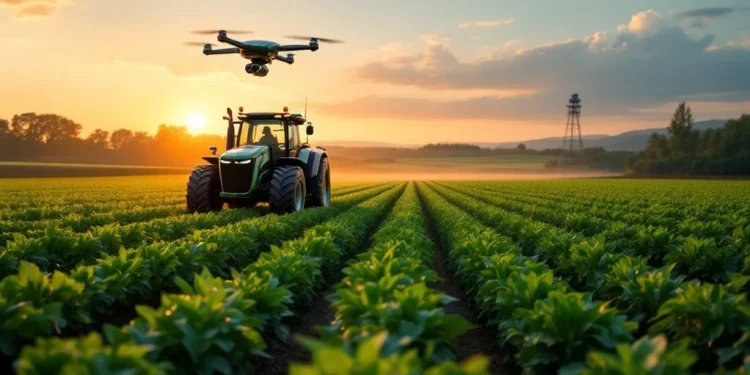AI in Agriculture uses advanced computer systems to make farming smarter and more efficient. AI-powered tools like machine learning and computer vision help farmers monitor crops, predict weather patterns, and manage resources. These technologies collect real-time data about soil conditions, plant health, and pest problems through sensors and drones. The agricultural AI market reached $1.5 billion in 2023 and continues transforming modern farming practices. Exploring these innovations reveals how AI is reshaping the future of food production.

The agricultural sector is experiencing a dramatic transformation through artificial intelligence (AI). The market for AI in agriculture reached $1.5 billion in 2023 and is expected to grow to $3 billion by 2026, showing how quickly farmers are embracing these new technologies. This rapid growth reflects a CAGR of about 24.5%, demonstrating strong confidence in AI’s ability to improve farming practices.
Field farming currently leads AI adoption, representing over 61% of the market. Farmers are using AI-powered tools like machine learning, predictive analytics, and computer vision to make better decisions about their crops. Smart monitoring systems connected to AI have shown a projected market value of 8.5 billion dollars by 2028. These technologies help monitor plant health, detect pests, and determine the best times for planting and harvesting.
The integration of AI with Internet of Things (IoT) sensors has created powerful systems for farm management. These systems collect real-time data about soil conditions, weather patterns, and crop health. Farmers can now use this information to apply water and fertilizers precisely where and when they’re needed, reducing waste and improving crop yields. Smart farming technology has attracted significant investment, reaching $4.9 billion in 2021 across 440 deals.
AI-enabled farming practices have revolutionized traditional agriculture. Autonomous tractors guided by AI can plant and spray crops with greater precision than human operators. Drones equipped with AI cameras monitor large fields quickly and efficiently, identifying problems before they become serious. Indoor farming operations use AI to maintain ideal growing conditions year-round.
Large-scale farms are leading the way in AI adoption, with 40% planning to increase their AI investments by 30% in 2024. Software solutions make up 45.2% of the AI agriculture market, showing that farmers value digital tools for managing their operations. These tools help predict yields, plan harvests, and manage supply chains more effectively.
However, implementing AI in agriculture isn’t without challenges. The technology requires high-quality data to function properly, and the initial costs can be significant. Small-scale farms often find it difficult to afford these systems, and there’s a growing need for workers who understand how to use AI tools effectively.
Despite these challenges, the market is projected to exceed $10 billion by 2032. This growth suggests that AI will continue to play an increasingly important role in feeding the world’s growing population. As the technology becomes more accessible and farmers become more familiar with its benefits, AI is likely to become a standard tool in agricultural operations of all sizes.
Frequently Asked Questions
How Much Does It Cost to Implement AI Technology in Farming?
AI implementation costs in farming range from $15,000 to over $300,000. Basic solutions cost $30,000-$100,000, mid-range solutions $100,000-$200,000, and high-end automation systems exceed $200,000.
Can Small-Scale Farmers Benefit From Agricultural AI Solutions?
Small-scale farmers can benefit from AI solutions through improved crop monitoring, efficient resource management, and market data access, despite facing initial cost barriers and technical complexity challenges.
What Technical Skills Do Farmers Need to Use AI Systems?
Farmers need basic digital literacy, data management skills, proficiency with farm management software, understanding of sensor technologies, and ability to interpret AI-generated insights for practical decision-making.
How Reliable Are AI Predictions for Crop Yield and Disease Detection?
AI predictions show high reliability in crop yield forecasting, with accuracy improvements of up to 7%. Disease detection systems demonstrate strong performance through early warning capabilities and precise image analysis.
Does AI Farming Technology Work Effectively in All Weather Conditions?
AI farming technology performs effectively across most weather conditions, though extreme or unpredictable events can challenge its accuracy. The system continuously adapts and improves through real-time data collection and analysis.


